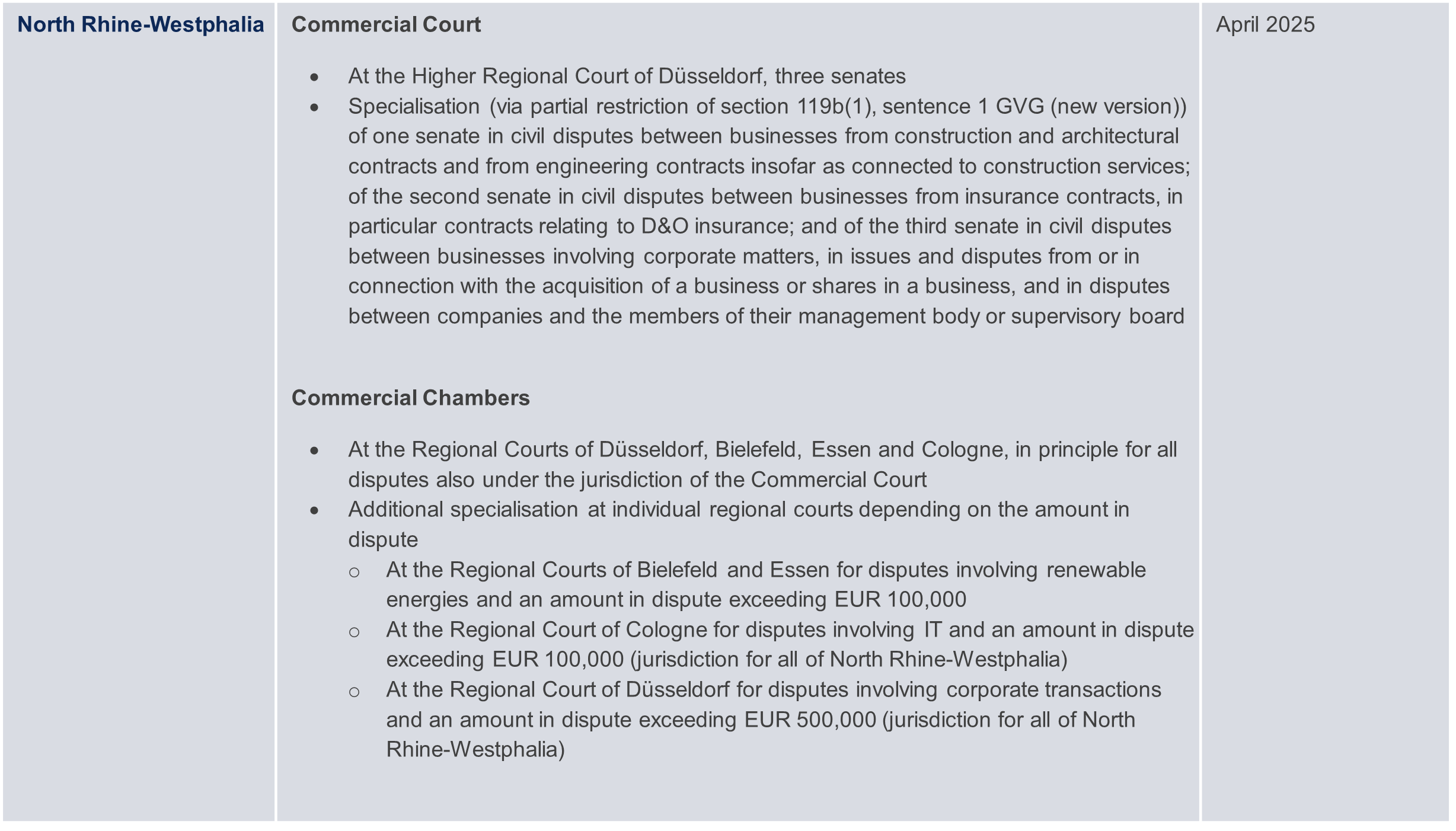
The Act to Strengthen Germany as a Forum for Litigation (Justizstandort-Stärkungsgesetz) came into force on 1 April 2025. The Act aims to offer parties to (international) commercial disputes more modern, streamlined court procedures, enhancing Germany’s appeal as a forum for litigation (for details on the Act’s main features, see our article of 9 July 2024: Justizstandort-Stärkungsgesetz – Einführung von Commercial Courts und Englisch als Gerichtssprache (German-language article)).
1. What’s new
One significant change is the introduction of special panels for certain commercial disputes at the Higher Regional Courts (“Commercial Court”) and the Regional Courts (“Commercial Chambers”) level. In principle, hearings before these panels can be conducted in English.
The federal states are responsible for setting up these special panels, but each state is limited to only one Commercial Court. By contrast, Commercial Chambers can be set up at as many Regional Courts as desired within a federal state.
a) Commercial Courts
Where a Commercial Court has been set up at a Higher Regional Court, it will have first-instance jurisdiction for certain commercial disputes where the amount in dispute is EUR 500,000 or more:
- if the parties have expressly or tacitly agreed this; or
- if, pursuant to section 610(2), sentence 1 Code of Civil Procedure (Zivilprozessordnung, “ZPO”) (new version), the plaintiff requests this in the statement of claim and the defendant does not object in the statement of defence (cf. section 119b(1), (2) Courts Constitution Act (Gerichtsverfassungsgesetz, “GVG”) (new version)).
Pursuant to section 184a(3), sentence 1 GVG (new version), this also applies to the decision to conduct proceedings in English.
The parties’ decision to have proceedings conducted before a Commercial Court shortens the appeal process. The only available remedy against the Commercial Court’s decision is an appeal to the Federal Court of Justice (cf. section 614 ZPO (new version)). In appeal proceedings, however, the parties must first request that the proceedings be conducted in English. The Federal Court of Justice may reject this request or may initially order that the proceedings be conducted in English, with a subsequent switch to German at a later stage (cf. section 184b(1), sentence 1, (2) GVG (new version)).
b) Commercial Chambers
In addition to the Commercial Courts, the Act also permits English-speaking Commercial Chambers to be established at the Regional Courts for the types of disputes listed in section 119b(1), sentence 1 GVG (new version) (cf. section 184a(1), sentence 1, no. 1, alternative 1 GVG (new version)). The federal states may themselves decide at which Regional Courts to establish commercial chambers and, in particular, whether such chambers are to have jurisdiction beyond the district of the Regional Court itself.
Commercial Chambers are regular (civil or commercial) divisions of the regional court (Zivilkammer or Kammer für Handelssachen). A dispute must therefore not only fall within the local jurisdiction of the Regional Court concerned (whether by law or agreement between the parties or, if applicable, by way of extended jurisdiction) but also have a subject matter for which the Commercial Chamber is competent.
If these conditions are met, the parties may then bring the dispute before the Commercial Chamber either by agreeing to conduct the proceedings in English in accordance with section 184a(3) GVG (new version) or by the defendant submitting a defence in English without an objection being raised.
In certain commercial disputes, therefore, the parties can negotiate in English at first instance while retaining the option to appeal using the regular appeal procedure.
c) Other procedural innovations
Section 612 ZPO (new version) allows the parties to proceedings before the Commercial Courts and Commercial Chambers to decide how to structure the proceedings. Section 613 ZPO (new version) also allows for the possibility of verbatim transcripts. These innovations are inspired by the standard procedure in arbitration proceedings.
2. Status of implementation in the federal states
The German legislature had assumed that a Commercial Court would likely only be established in five federal states.
In fact, Commercial Courts have now been established in a total of nine federal states (Baden-Württemberg, Bavaria, Berlin, Bremen, Hamburg, Hesse, Lower Saxony, North Rhine-Westphalia, and Saxony). Saxony has a special feature: proceedings before the Commercial Court in Dresden can be conducted in German only.
Moreover, the federal states have each taken an independent approach also regarding the types of disputes that the Commercial Courts are competent to hear. For example, while the Commercial Court at the Higher Regional Court of Berlin is limited to disputes relating to construction and architectural law, the Commercial Court at the Higher Regional Court of Celle is competent to hear all disputes falling under section 119b(1), sentence 1 GVG (new version).
There is yet more inconsistency at the level of the Commercial Chambers at the Regional Courts. In some federal states (e.g. Baden-Württemberg), the Commercial Chambers have the same specialisation as the Commercial Court; in others (e.g. Bremen), there is a Commercial Court but no Commercial Chambers. Moreover, jurisdiction over appeals has not been fully established in the Commercial Courts in some federal states. In such cases, there is no guarantee that the Commercial Court in the relevant federal state will be competent to hear an appeal against a judgment by a Commercial Chamber in that state. In North Rhine-Westphalia, for example, it is the Higher Regional Court of Hamm and not the Commercial Court at the Higher Regional Court of Düsseldorf that has jurisdiction over appeal proceedings against a judgment by the Commercial Chamber at the Regional Court of Bielefeld.
The following table provides a summary of the implementation status of the Act in the individual states (current as at 7 January 2026):
Conclusion
The Act to Strengthen Germany as a Forum for Litigation is a welcome first step towards enhancing Germany’s international appeal as a forum for litigation. The greater specialisation of the courts in areas relevant to commercial disputes as well as the ability to structure the proceedings are important factors that can improve and streamline dispute resolution in the German courts. It is also to be hoped that the interest shown by the German legislature in enhancing the attractiveness of Germany as a forum for litigation will have a positive impact on the courts in general
However, much is still in flux, and it remains to be seen in the coming months and years whether the various options now open to the federal states will bear fruit in practice. A lot will hinge on how the parties involved embrace the different constellations in the individual federal states. It will be up to the courts to breathe life into the new opportunities on offer.
Against this backdrop, it is more important than ever for companies to review the dispute resolution clauses in their contracts – existing and new – and adapt them if necessary.

















